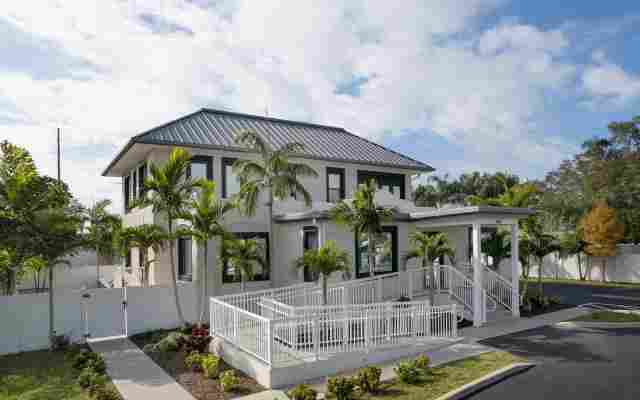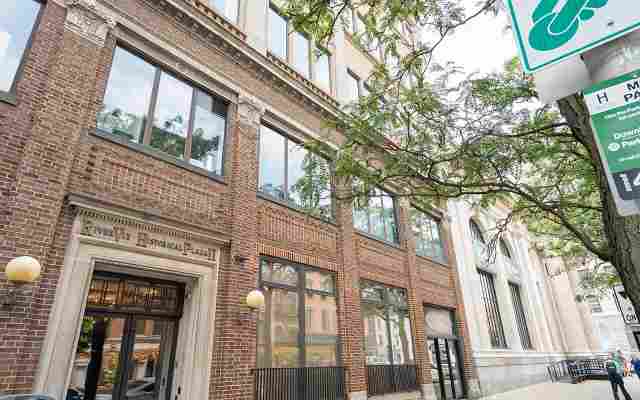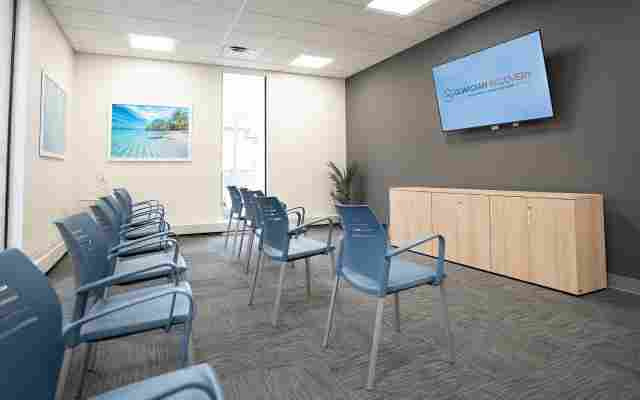
Delray Beach, Florida, United States
Immersion Recovery Center
Verified
Verified
This provider’s information has been quality-checked by Recovery.com’s Research Team for accuracy and completeness, including center verification through appropriate third-party organizations.
Joint Commission Accredited
The Joint Commission accreditation is a voluntary, objective process that evaluates and accredits healthcare organizations (like treatment centers) based on performance standards designed to improve quality and safety for patients. To be accredited means the treatment center has been found to meet the Commission's standards for quality and safety in patient care.
Provider's Policy
Immersion Recovery Center offers free no obligation insurance benefits checks. They most likely accept your health insurance plan. We do not accept medicaid or medicare at this location however we have additional locations in NJ, ME & CO that accept Medicaid from those states.
Estimated Cash Pay Rate
The cost listed here ($24,500+) is an estimate of the cash pay price. Center pricing can vary based on program and length of stay. Contact the center for more information. Recovery.com strives for price transparency so you can make an informed decision.
Highlights from the Center
Highlights
These highlights are provided by and paid for by the center.
Perfect for Professionals
Medically Assisted Detox
Certified Professionals
Private Rooms Available
About Immersion Recovery Center
Immersion Recovery Center is a leader in substance use disorder treatment with two decades of experience providing a full continuum of care for clients and their families. They use a combination of evidence-based practices and holistic methods to provide an individualized recovery experience for each client. Clients will have the opportunity to engage in 12-Step facilitation, traditional talk therapy, life skills training, recreational outings, yoga, and much more. Immersion Recovery Center is part of Guardian Recovery.
Customized Care in Each Phase of Recovery
Immersion Recovery offers medical detox, residential care, a partial hospitalization program (PHP), an intensive outpatient program (IOP), virtual options, and aftercare planning using a three-phase approach.
Phase 1 focuses on detox, residential care, and stabilization. Phase 2 gets clients motivated for recovery via the PHP (day treatment), a full-day program with the option for clients to live at home or in a sober living residence.Phase 3 centers around reintegration, outpatient care, and sober living if desired.
These phases can stretch out to a year of treatment, or shorten for a speedier track to recovery. The time spent in each phase is up to each client and their clinical team. In all levels of care, clients participate in evidence-based therapies such as motivational interviewing, dialectical behavioral therapy (DBT), and eye movement desensitization and reprocessing (EMDR).
Family-Wide Recovery and Aftercare
Immersion Recovery holds family workshops and family therapy, helping families become the recovery allies for their loved ones. Psychoeducational and healing lectures bring clarity and hope. Clients can enjoy this aspect of treatment in residential care, PHP, and Immersion’s outpatient services. Immersion Recovery Center has robust aftercare planning for long-lasting recovery. Alumni engage in 12-Step meetings and individual and group therapy. They organize regular group meet-ups and recovery-friendly activities to support alumni. Immersion Recovery also offers a comprehensive list of resources for those in early recovery.
Luxurious and Comprehensive Care
Located in Delray Beach, Florida, Immersion Recovery Center offers shared and private bedrooms, therapy rooms, a large common area, a communal dining area, and a lounge for relaxing and socializing. Clients can enjoy grilling on the outdoor barbecue, playing volleyball in the backyard, and having movie nights in the living room. Immersion Recovery offers holistic healing through nutrition therapy, yoga therapy, recreation therapy with snorkeling, kayaking, paddle boarding, hiking, art, and music.
Read More

Insurance Accepted
Provider's Policy:Immersion Recovery Center offers free no obligation insurance benefits checks. They most likely accept your health insurance plan. We do not accept medicaid or medicare at this location however we have additional locations in NJ, ME & CO that accept Medicaid from those states.
More Guardian Recovery Network Locations
3 Phases of Recovery for Lasting Healing
Immersion Recovery’s 3-Phase program takes clients through all stages of recovery, starting with detox and stabilization in a residential setting. Clients then transition to day treatment and outpatient care with the option for sober living. Each phase typically lasts 28 days, with phase 3 lasting as long as clients see fit. Each client receives a wholly personalized and intensive approach to lasting recovery.
Treatment Blended to Individual Needs
Immersion Recovery uses a combination of evidence-based, holistic, and 12-Step care to meet client needs. A clinical assessment during admissions helps their team create an effective treatment plan using their resources, taking into account the preferences and desires of each client. Clients participate in various therapies and activities, including 12-Step meetings, dialectical behavioral therapy (DBT), life skills training, recreational outings, and yoga therapy.
Executive And Family Programs
Understanding the needs of executive clientele, Immersion Recovery offers an executive treatment plan that allows greater privacy and phone and laptop access. CEOs, entrepreneurs, celebrities, and others who require a private space to work can do so at Immersion. For families, Immersion Recovery offers a specific family program with family therapy and family workshops.
Dual-Diagnosis Care
Immersion Recovery treats addiction and co-occurring mental health conditions, knowing that the two often co-occur. Their clinical and therapeutic staff strive to heal the root cause of each condition. Their combination of evidence-based practices and holistic methods provide an individualized recovery experience for each client.

Center Overview
Estimated Cash Pay Rate
Executives
Executive treatment programs typically directly support the needs of people who manage businesses and may provide flexible schedules and office space to allow work during treatment.
LGBTQ+
Addiction and mental illnesses in the LGBTQ+ community must be treated with an affirming, safe, and relevant approach, which many centers provide.
Professionals
Busy, high-ranking professionals get the personalized treatment they need with greater accommodations for work, privacy, and outside communication.

Treatment Focus
This center treats primary substance use disorders and co-occurring mental health conditions. Your treatment plan addresses each condition at once with personalized, compassionate care for comprehensive healing.
Treatment
Specializations
Alcohol
Using alcohol as a coping mechanism, or drinking excessively throughout the week, signals an alcohol use disorder.
Co-Occurring Disorders
A person with multiple mental health diagnoses, such as addiction and depression, has co-occurring disorders also called dual diagnosis.
Drug Addiction
Drug addiction is the excessive and repetitive use of substances, despite harmful consequences to a person's life, health, and relationships.
Executives
Executive treatment programs typically directly support the needs of people who manage businesses and may provide flexible schedules and office space to allow work during treatment.
Opioids
Opioids produce pain-relief and euphoria, which can lead to addiction. This class of drugs includes prescribed medication and the illegal drug heroin.
Prescription Drugs
It's possible to abuse any drug, even prescribed ones. If you crave a medication, or regularly take it more than directed, you may have an addiction.
Professionals
Busy, high-ranking professionals get the personalized treatment they need with greater accommodations for work, privacy, and outside communication.
Trauma
Some traumatic events are so disturbing that they cause long-term mental health problems. Those ongoing issues can also be referred to as "trauma."
Treatment Services
Day Treatment
In a PHP, patients live at home but follow an intensive schedule of treatment. Most programs require you to be on-site for about 40 hours per week.
Detox
Detox fully and safely removes toxic substances from the body, allowing the next steps in treatment to begin with a clean slate.
Intensive Outpatient Program
In an IOP, patients live at home or a sober living, but attend treatment typically 9-15 hours a week. Most programs include talk therapy, support groups, and other methods.
Outpatient
During outpatient rehab, patients attend a structured treatment program while continuing to live at home.
Residential
In a residential rehab program, patients live onsite, with access to daily treatment and 24-hour care. An average stay is 30-90 days.
Approaches
Evidence-Based
A combination of scientifically rooted therapies and treatments make up evidence-based care, defined by their measured and proven results.
Family Involvement
Providers involve family in the treatment of their loved one through family therapy, visits, or both–because addiction is a family disease.
Medical
Medical addiction treatment uses approved medications to manage withdrawals and cravings, and to treat contributing mental health conditions.
Twelve Step
Incorporating spirituality, community, and responsibility, 12-Step philosophies prioritize the guidance of a Higher Power and a continuation of 12-Step practices.
Therapies
1-on-1 Counseling
Patient and therapist meet 1-on-1 to work through difficult emotions and behavioral challenges in a personal, private setting.
Meditation & Mindfulness
A practiced state of mind that brings patients to the present. It allows them to become fully aware of themselves, their feelings, and the present moment.
Mindfulness Therapy
This ancient practice can be mental, emotional, and even spiritual. In meditation, you focus your attention on the present moment without judgement.
Art Therapy
Visual art invites patients to examine the emotions within their work, focusing on the process of creativity and its gentle therapeutic power.
Equine Therapy
Guided interactions with trained horses, their handler, and a therapist can help patients improve their self-esteem, trust, empathy, and social skills.
Experiential Therapy
With this approach, patients heal by doing. Therapists help patients process difficult emotions to speak, using guided activities like art or dance.
Eye Movement Therapy (EMDR)
Lateral, guided eye movements help reduce the emotional reactions of retelling and reprocessing trauma, allowing intense feelings to dissipate.
Family Therapy
Family therapy addresses group dynamics within a family system, with a focus on improving communication and interrupting unhealthy relationship patterns.
Conditions We Treat
Grief and Loss
Grief is a natural reaction to loss, but severe grief can interfere with your ability to function. You can get treatment for this condition.
Anger
Although anger itself isn't a disorder, it can get out of hand. If this feeling interferes with your relationships and daily functioning, treatment can help.
Anxiety
Anxiety is a common mental health condition that can include excessive worry, panic attacks, physical tension, and increased blood pressure.
Bipolar
This mental health condition is characterized by extreme mood swings between depression, mania, and remission.
Burnout
Burnout entails mental and physical exhaustion, and leads to a severe lack of fulfillment. This condition is often caused by overwork.
Chronic Pain Management
Long-term physical pain can have an affect on mental health. Without support, it can also impact your daily life and even lead to addiction.
Codependency
Codependency is a pattern of emotional dependence and controlling behavior. It's most common among people with addicted loved ones.
Post Traumatic Stress Disorder
PTSD is a long-term mental health issue caused by a disturbing event or events. Symptoms include anxiety, dissociation, flashbacks, and intrusive thoughts.
Stress
Stress is a natural reaction to challenges, and it can even help you adapt. However, chronic stress can cause physical and mental health issues.
Trauma
Some traumatic events are so disturbing that they cause long-term mental health problems. Those ongoing issues can also be referred to as "trauma."
Substances We Treat
Alcohol
Using alcohol as a coping mechanism, or drinking excessively throughout the week, signals an alcohol use disorder.
Benzodiazepines
Benzodiazepines are prescribed to treat anxiety and sleep issues. They are highly habit forming, and their abuse can cause mood changes and poor judgement.
Chronic Relapse
Consistent relapse occurs repeatedly, after partial recovery from addiction. This condition requires long-term treatment.
Co-Occurring Disorders
A person with multiple mental health diagnoses, such as addiction and depression, has co-occurring disorders also called dual diagnosis.
Cocaine
Cocaine is a stimulant with euphoric effects. Agitation, muscle ticks, psychosis, and heart issues are common symptoms of cocaine abuse.
Drug Addiction
Drug addiction is the excessive and repetitive use of substances, despite harmful consequences to a person's life, health, and relationships.
Ecstasy
Ecstasy is a stimulant that causes intense euphoria and heightened awareness. Abuse of this drug can trigger depression, insomnia, and memory problems.
Heroin
Heroin is a highly addictive and illegal opioid. It can cause insomnia, collapsed veins, heart issues, and additional mental health issues.
Psychedelics
Hallucinogenic drugs—like LSD—cause euphoria and increased sensory experiences. When abused, they can lead to depression and psychosis.
Aftercare
Experience
Personal Amenities
Amenities
Special Considerations
Executive Program
Addiction and mental health treatment for executives typically involves high discretion, greater technology access, and more private, 1-on-1 care.
Flexible technology policies
Centers with flexible technology policies allow professionals to stay in touch with work and give patients a greater sense of connection and normalcy.
Gender-specific groups
Patients in gender-specific groups gain the opportunity to discuss challenges unique to their gender in a comfortable, safe setting conducive to healing.
Activities
Yoga
Yoga is both a physical and spiritual practice. It includes a flow of movement, breathing techniques, and meditation.
Off-Site Activities
Off-Site Amenities
Professional Staff

Dr. Daphne Dorce
Medical Director
MD

Charrisse Clark-Smith
Chief Nursing Officer
RN

Anna Parker
12 Step Director

Chris Baker
Primary Therapist
LCSW
View More Team Members
Learn more about Immersion Recovery Center
Testimonial
When I worked through the program that was laid out for me at Immersion, my life completely fell into place. I learned honesty and integrity, and I learned why I had turned to substances in the first place. They did a really good job of educating me; of teaching me why I was operating the way I was and how to make lasting changes in my life.
Alumni
Accommodations
Food & Nutrition
Treatment
Value
Pros
- Treated With Respect (2)
- Supportive Aftercare (5)
- Luxurious Accommodations (2)
- Gourmet & Nutritious Food (2)
Peter C
John Ca
Christine M
Judah
Lisa Chirichella
We love hearing about your treatment experience
Help individuals and families seeking treatment by sharing your first-hand experience with this treatment provider. Review Guidelines.




















































